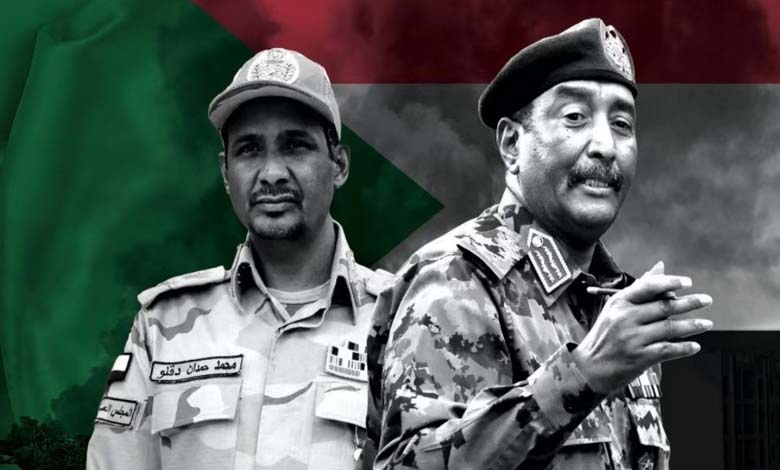Sudan Between Looting Generals and Warmongering Islamists

Sudanese citizens no longer need international analysts to understand that their country is run in the shadows by shady deals between generals and the Islamist current, while it is the people alone who bear the cost of chaos. The war is no longer merely a clash between the army and the Rapid Support Forces (RSF); it has become an open stage for corruption, blackmail, and concessions made at the expense of sovereignty and national dignity.
-
El-Fasher: the knot that sums up the Sudanese crisis
-
Sudan Between the Hammer of Its Crises and the Anvil of Turkish Influence
Burhan, who claims to defend the state, is mired in contradictions. On one hand, he secretly negotiates with the RSF in an attempt to marginalize the Islamists; on the other, he remains bound to their daily influence. This duplicity reveals an army that has lost its compass, willing to ally with any force that guarantees its generals’ survival—even if it means sacrificing the nation.
In El-Fasher, the bitter truth has come to light: the army abandoned armed movements, leaving the people of western Sudan to face the war machine alone. This was not a military miscalculation, but a political decision rooted in discrimination. Such a mindset deepens regional divides and entrenches a sense of injustice that will inevitably erupt.
-
Disguised Guardianship: Sudan Between Its Internal Chaos and Ankara’s Expanding Influence
-
Sudan Between Epidemics and Collapse: An Incapable State and a People Facing Death
In Port Sudan, the temporary capital, the situation is equally catastrophic: hospitals are empty, epidemics spread unchecked, and medicine is hoarded for the war effort instead of reaching patients. What kind of authority places the survival of its citizens last, turning death by disease into the price of a senseless war?
Gold, the lifeblood of Sudan’s economy, has been turned into personal loot for the generals. Sold on black markets and smuggled abroad with the complicity of top officials, it no longer benefits the national treasury. Once a national asset, gold has become both fuel for endless war and a tool of personal enrichment.
-
Sudan Faces Total Health Collapse as Epidemics Spread and 160 Hospitals Shut Down
-
The Army in Luxury, the People in Slow Death: Sudan on the Brink of Total Collapse
Even on the battlefield, the army is no longer a unified force: withdrawals in Kordofan, defeats in El-Fasher, and growing fractures between officers and Islamists. Some believe the Islamists are dragging the country into a war without end, while others insist on military escalation as if Sudan could endure more bloodshed. These rifts have turned the military into a political corpse waiting to be buried.
Worse still, Burhan has reportedly agreed to make concessions on key sovereignty issues, including maritime boundaries and granting a neighboring country the right to manage and operate Port Sudan, in exchange for political and military backing. What greater betrayal than selling off national sovereignty under the guise of “necessity”?
-
White Nile: War Kills Civilians Before Soldiers in Sudan
-
White Nile: Fire Messages Between Domestic and External Fronts in Sudan
The Islamists, for their part, embody the other face of tragedy. Their obsession with military solutions is not a sign of strength but of chronic failure to accept peaceful alternatives. They would rather see Sudan burn than admit the collapse of their project. Such a mindset threatens not only the present but the future of the nation.
Adding to the crisis is Egypt’s constant pressure. Its military and diplomatic support comes with strings attached: painful concessions on Halayeb, Shalateen, and Nile water rights. Thus, Sudan is reduced to a hostage in the hands of a neighboring power, while its generals trade sovereignty for their own survival.
-
Sudan… Washington sanctions Jibril Ibrahim and the “Al-Baraa ibn Malik” brigade
-
Between Deception and Failure: How the Sudanese Army Manufactures Illusory Victories
The conclusion is clear: Sudan is not simply held hostage by a war between the army and the RSF, but by the corruption of its generals and the obstinacy of the Islamists. Both sides share in the destruction, viewing citizens merely as fuel for a war with no horizon. The key question remains: how long will Sudanese people remain prisoners of generals who sell sovereignty and Islamists who insist on war?
The answer lies neither with Burhan nor the Islamists, but with the people who bear the cost. Either Sudanese citizens break this infernal equation, or they will remain captive to a war that will consume everything: the land, the wealth, and the people themselves.












